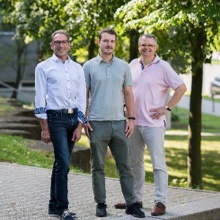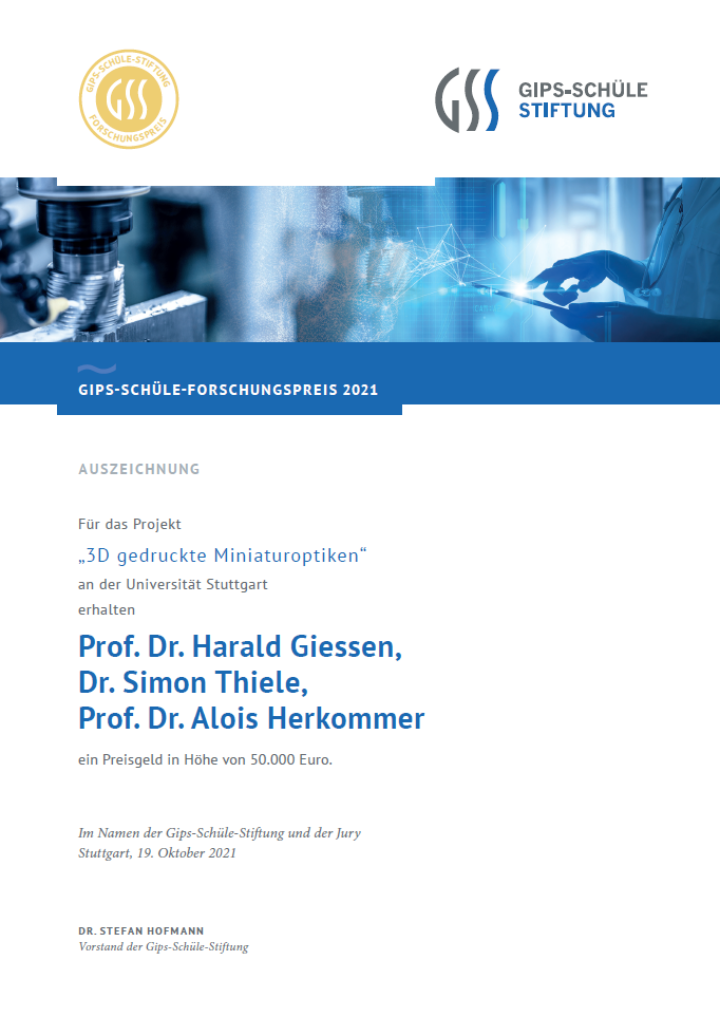The world's smallest miniature optics using 3D printing for novel endoscopes and sensors
Stuttgart, 14.10.2021; "Technology for people" is the motto under which the Gips-Schüle Foundation awards its prizes every two years. The evaluation criteria are interdisciplinarity, innovation potential and application relevance in combination with social benefit. Seventeen proposals from research institutions and universities throughout Baden-Württemberg were submitted this year. The Research Award focuses on technical innovation.
The award ceremony with around 200 invited guests from politics, science, business and the foundation sector will take place within the framework of a festive evening event - in compliance with all currently applicable requirements - on 19 October 2021 at the Friedrichsbau Varieté in Stuttgart. In addition to the work of the award winners, the focus this year will also be on other research projects supported by the Gips-Schüle Foundation at various universities.
The Gips-Schüle Research Award 2021 goes to the team of Prof. Dr. Harald Giessen, Prof. Dr. Alois Herkommer and Dr. Simon Thiele from the University of Stuttgart. The researchers developed 3D printing technology as well as new materials and processes to produce the world's smallest miniature optics, together with their teams at the 4th Institute of Physics and the Institute of Technical Optics under the umbrella of the interdisciplinary research centre SCoPE (Stuttgart Research Center of Photonics Engineering).
Before this invention, micro-optics were limited in performance by mostly spherical or hemispherical glass optics. The work of the three researchers made it possible to produce 3D-printed lenses with complex surfaces that have much lower imaging errors and are thus much more powerful than conventional optics.
Multi-lens systems could also be realised through 3D printing. This made extremely good imaging optics such as ultra-wide angle systems possible, which are particularly important for endoscopes with the highest imaging quality. 3D printing makes it possible to produce not only the micro-optics but also the support structures in one process step.
The scientists also developed systems made of several printing materials that could correct colour errors of the micro-objectives. For this purpose, a large class of new 3D printable materials was realised by combining polymers and nanoparticles. Other techniques, such as the introduction of blackened absorbing materials to realise apertures, could also be worked out. The researchers have developed special simulation programmes for the design process of these very small optics.
It could be shown for the first time that such high-quality microlenses, which had diameters of only a few micrometres up to 2 mm, could be printed directly onto glass fibres. Thus, a completely new type of optical endoscope was realised that far surpasses the previous state of the art. 3D printing on CMOS miniature camera chips that function as an optical image sensor has become possible thanks to the research results, as has the parallel printing of a combination of wide-angle, normal and telephoto lenses on a chip in order to electronically zoom and change the angle of view. In addition, this technique made it possible to demonstrate a miniature spectrometer with a diameter of 0.1 mm. The massive miniaturisation additionally offers great application potential in many areas such as measurement technology, production and process monitoring, robotics, etc. A large Swabian company has already tested the Stuttgart-based optics in sensors that are to be used for autonomous driving.
Gips-Schüle Foundation
Badstr. 9, 70372 Stuttgart
Press: Kathrin Hecht
Phone: +49 89 809 13 17-44
E-Mail: info@gips-schuele-stiftung.de



